
The Distinguished Service Cross (DSC) is the United States Army's second highest military decoration for soldiers who display extraordinary heroism in combat with an armed enemy force. Actions that merit the Distinguished Service Cross must be of such a high degree that they are above those required for all other U.S. combat decorations, but which do not meet the criteria for the Medal of Honor. The Army Distinguished Service Cross is equivalent to the Naval Services' Navy Cross, the Air and Space Forces' Air Force Cross, and the Coast Guard Cross. Prior to the creation of the Air Force Cross in 1960, airmen were awarded the Distinguished Service Cross.

Brigadier General John Thomas Corley was a career United States Army officer who served with distinction in World War II. He was also noted for his contributions to army training.

Lieutenant General Thomas R. Turner II is a retired United States Army officer, who served as the commander of the 101st Airborne Division and United States Army North, Fort Sam Houston, Texas.

Lieutenant General Robert T. Clark is a retired United States Army officer. His last assignment was as the Commanding General, Fifth United States Army which he commanded from December 5, 2003 to December 2006.
Brigadier General James G. Shanahan served in the United States Army from 1942 through 1973.

Stephen M. Twitty is a retired lieutenant general in the United States Army. Twitty assumed command of First United States Army on July 15, 2016, relinquishing command to become deputy commander of United States European Command on 9 August 2018. Previously, he was commanding general of Fort Bliss and the 1st Armored Division. Twitty was awarded the Silver Star during Operation Iraqi Freedom. Noted for his relationship with journalist David Bloom, who was embedded with his battalion during the invasion of Iraq in 2003, Twitty has served in five combat deployments, including tours in the Gulf War, Afghanistan, Iraq, and Kuwait. He has commanded at the company, battalion, and brigade level during the wars in Iraq and Afghanistan. Twitty is a graduate of South Carolina State University and a member of the Omega Psi Phi fraternity. He was inducted into the South Carolina State University ROTC Hall of Fame in 2009, and selected as one of the university's Distinguished Alumni in 2004.

John William Foss was a United States Army general, and commander of the United States Army Training and Doctrine Command.

John Joseph Timothy Hennessey was a United States Army four-star general who served as Commander in Chief, United States Readiness Command (USCINCRED) from 1974 to 1979.

George Robinson Mather was a United States Army four-star general who served as Commander in Chief, United States Southern Command (USCINCSO) from 1969 to 1971.

Paul Lamar Freeman Jr. was a United States Army four-star general who served as Commander in Chief, United States Army Europe/Commander, Central Army Group from 1962 to 1965 and Commanding General, Continental Army Command from 1965 to 1967.
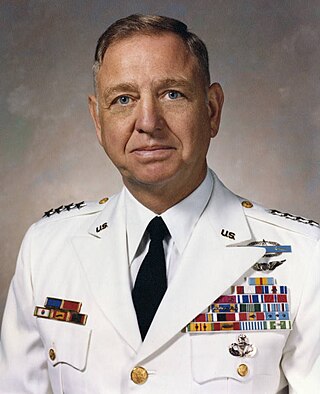
Sam Sims Walker was a United States Army general who served as the Commanding General of Allied Land Forces, South East Europe from 1977 to 1978.

John Franklin "Jack" Forrest was a career officer in the United States Army and a combat commander during the Korean War and Vietnam War.

Daniel P. Bolger is an American author, historian, and retired a lieutenant general of the United States Army. He held a special faculty appointment in the Department of History at North Carolina State University, where he taught military history until his retirement in 2023.
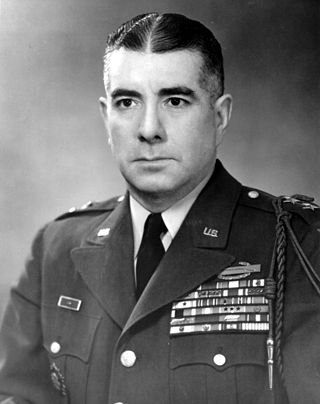
Lionel Charles McGarr was a lieutenant general in the United States Army. He was the last commander of Military Assistance Advisory Group – Vietnam.
Herbert Joseph McChrystal Jr. was an major general in the United States Army and the father of General Stanley A. McChrystal.
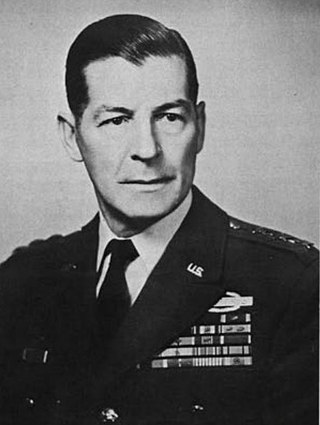
Gordon Byrom Rogers was a United States Army lieutenant general who served in several command positions during World War II and the Korean War, including the United States Military Advisory Group to the Republic of Korea and the 3rd Armored Division.
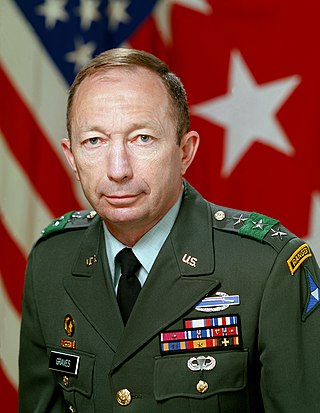
Richard Gordon Graves is a retired lieutenant general in the United States Army. He was Commander of III Corps and Fort Hood. He is a 1958 graduate of the U.S. Military Academy.
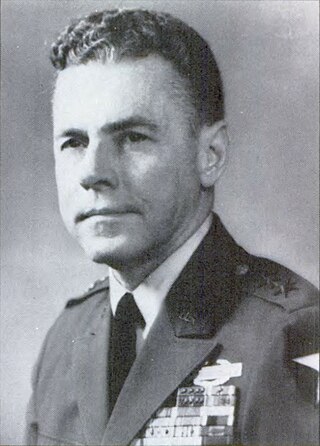
John Royster "Roy" Thurman III was a United States Army lieutenant general.
![<span class="mw-page-title-main">Frederic J. Brown III</span> U.S. Army lieutenant general]](https://upload.wikimedia.org/wikipedia/commons/thumb/2/21/Frederic_J._Brown_III_%28U.S._Army_lieutenant_general%29.jpg/320px-Frederic_J._Brown_III_%28U.S._Army_lieutenant_general%29.jpg)
Frederic J. Brown III is a retired United States Army officer. A veteran of the Vietnam War, he attained the rank of lieutenant general and was a recipient of the Army Distinguished Service Medal (2), Silver Star, Legion of Merit, Distinguished Flying Cross, and multiple awards of the Bronze Star Medal. Brown is best known for his service as Chief of Armor and Cavalry from 1983 to 1986 and command of Fourth United States Army from 1986 to 1989.

John W. Bowen was a career officer in the United States Army. A veteran of World War II and the Korean War, he served in the Organized Reserve Corps from 1927 to 1928, and in the army from 1932 to 1968, and he attained the rank of lieutenant general. His commands included the 26th Infantry Regiment (1943), 82nd Airborne Division (1956–1957), Third United States Army (1964), and XVIII Airborne Corps (1964–1965). Among his awards and decorations were four awards of the Army Distinguished Service Medal, Silver Star (2), Legion of Merit, Bronze Star Medal, Croix de Guerre (France), Order of Military Merit, Republic of Korea Presidential Unit Citation, Combat Infantryman Badge, and Senior Parachutist Badge.























![<span class="mw-page-title-main">Frederic J. Brown III</span> U.S. Army lieutenant general]](https://upload.wikimedia.org/wikipedia/commons/thumb/2/21/Frederic_J._Brown_III_%28U.S._Army_lieutenant_general%29.jpg/320px-Frederic_J._Brown_III_%28U.S._Army_lieutenant_general%29.jpg)


